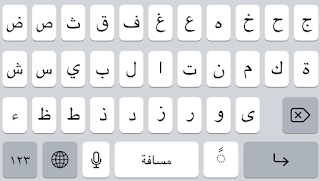One thing that helped me a lot this past week was speaking with a native Arabic speaker. I was able to talk about how I can better pronounce three letters (ه خ ح). After trying to do them it was much better to have them point out which ways were correct or not. I'd quickly take notes to try to explain to myself what I was doing with my mouth to better emphasize that for future times.
I started with the alphabet. When I originally began learning the language I wanted to learn the alphabet as I felt it would help me to sound words out whether I understood what they meant or not. By using an Arabic keyboard, I've forced myself to learn all of the letters and now am much better at recognizing certain ones that I wasn't as sure of before. This also allowed me to learn new words in a way that as I am chatting using HelloTalk I can actually recognize certain words that I have been using myself. I would rate this as success!
 |
| I'm starting to get used to finding these letters on a keyboard! |
My last plan was to use a CD that I got to listen to Arabic dialogue while driving in my car. This would in turn allow me to practice repeating phrases and listening to them as well. Great news, the CD is not actually a CD, it is a DVD. I put it in my car on Monday morning and was all set like, "Here we go let's do this!!!" and my car spit it right back out......yay. This plan did not go as well as I had hoped, due to I literally can't do it, so I'm just going to move past it.
A few things that have caused some issues for me beyond just knowing where to go is understanding what language to really learn. Within Arabic there are many different dialects that are spoken based on the countries. Most people begin by either learning Modern Standard Arabic (MSA) or Egyptian Arabic. MSA is a more formal style that is reserved primarily for writing whereas Egyptian Arabic is the dialect you hear in most movies. I didn't want to settle on a dialect immediately because I want the ability to speak with people from many countries. Who knows if somebody from Iraq or Morocco would understand an Egyptian dialect? These dialects don't just have different accents but different words and phrases as well.
Another part that makes reading difficult is that a lot of the vowel sounds are not shown. In more formal tenses that use accents to indicate the vowels but otherwise short vowels are not written. That means you basically have a lot of consonants with no clear idea of what vowel sounds to make. My approach for this is to think of how in English certain letters have different sounds in specific words. I'm hoping that the more I see certain words, I will instinctively know how to pronounce them without the vowels.
This weeks video is going to cover me doing two things. First, I'll go over trying to pronounce the three different letters I worked on all week (ه خ ح). Second, I'll try to cover a little small talk that would be something you can talk to almost anybody about. Typically, as I struggle I'll use the pronunciation that I've created but this time I will only be using the Arabic letters that make up the words. I'll likely miss some vowels a bit.
No comments:
Post a Comment